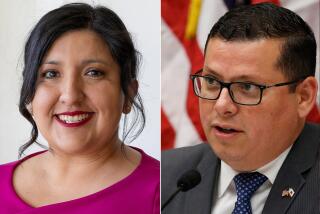Op-Ed: Opposing the TPP makes no sense in California
The two leading contenders in next year’s campaign to represent California in the U.S. Senate have been staunch supporters of President Obama. But both Democratic candidates, state Atty. Gen. Kamala D. Harris and Rep. Loretta Sanchez, have spoken out against one of Obama’s top remaining priorities: his prized expansion of free trade with leading Pacific Rim nations throughout Latin America and Asia. Their decision to stand in the way of the economic and diplomatic opportunities that Obama’s proposal would bring to California is disconcerting and disappointing.
Granted, Harris and Sanchez are far from alone in their opposition to Obama’s Trans-Pacific Partnership trade proposal, which would encompass 40% of the world’s economy, lowering tariffs and coordinating economic and regulatory policy with 11 other countries. Almost three-quarters of the Democrats currently in the Senate voted against the preliminary “fast-track authority” bill that passed that chamber Friday, and even larger majorities of the party’s House members will work to defeat it when it comes before them next month.
Still, one would hope that Democrats here would know better. These candidates aren’t running in the Rust Belt, where free trade is synonymous — rightly or wrongly — with closed manufacturing plants and abandoned Main Streets. They’re running in California: the capital of the Pacific Rim, the nation’s gateway to Asia and Latin America, where the benefits of expanded free trade are of crucial import to the technology, agriculture and transportation sectors.
This is a state in which Latinos have become the largest ethnic and racial group and in which Asian Americans now represent the fastest-growing immigrant communities. Yet our politicians lead the charge against a trade agreement that would strengthen relationships with the countries whose emigres now represent our identity and our future.
Harris, the strong front-runner in the Senate race and a close friend of Obama, told reporters at the recent state Democratic Party convention that she opposed the president’s trade pact because it didn’t offer sufficient worker protections.
Sanchez, the 10-term congresswoman from Orange County who tends to present herself as an economic moderate, did Harris one better. Not only did she reiterate her opposition to the TPP but also joined a protest line of union carpenters outside the convention center, in full view of television cameras, reporters and delegates.
Clearly both candidates are making the politically safe decision. If there was any doubt about that, it was dispelled when Sen. Elizabeth Warren told the convention audience that the TPP would “leave American workers in the dirt” — and received a rapturous response.
Make no mistake: this was a fiercely pro-Obama gathering. But the delegates’ loyalty to Obama was no match for the dominant protectionist tendencies that have dramatically deepened within the party since President Clinton dragged them along in support of the North American Free Trade Agreement more than 20 years ago.
During Clinton’s presidency, almost half the Democrats in the California House delegation voted for NAFTA. By contrast, just one of the state’s 39 House Democrats is supporting fast-track trade authority for Obama, and that one — Ami Bera of Sacramento — has made it clear that his support for fast-track does not necessarily extend to TPP.
Republicans should take no comfort in their rivals’ inconsistency: The GOP’s ongoing rejection of comprehensive immigration reform makes them equally complicit. One party builds walls to prevent the flow of people. The other constructs barriers to prevent the flow of goods and capital. Together, they illustrate how the hyperpolarization that has immobilized American politics is undermining our foreign policy and world standing.
But if the rest of the country suffers from these growing isolationist tendencies, California has even more to lose. For half a millennium, ever since the first explorers and missionaries reached these shores, the Pacific has provided us access to other cultures and profitable commercial relationships.
Last year, California exported more than $170 billion in goods and services to foreign nations, almost half to the 11 proposed TPP countries. Trade with those countries already accounts for more than 1.7 million jobs in the state.
Our ability to draw closer to the rest of the world has always been the source of our strength and our successes. When we reach across the ocean — whether for open markets and consumers, or for friends and co-workers — California flourishes. When we forget these lessons of history, we flounder.
Both of the last two presidents have worked mightily to convince the ideological bases of their respective parties that building walls between the United States and the rest of the world is a losing proposition. George W. Bush left office having failed to persuade Republicans to help him fix a broken immigration system. If Obama is to be any more successful in his efforts to move Democrats in support of his free-trade goals, he will need the Californians in his party to realize that their state’s future depends on it.
Dan Schnur is the director of the Jesse M. Unruh Institute of Politics at USC.
Follow the Opinion section on Twitter @latimesopinion and Facebook
More to Read
A cure for the common opinion
Get thought-provoking perspectives with our weekly newsletter.
You may occasionally receive promotional content from the Los Angeles Times.






